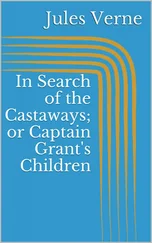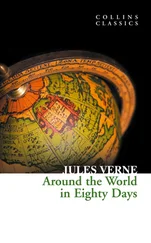Jules Verne - Round the World in Eighty Days
Здесь есть возможность читать онлайн «Jules Verne - Round the World in Eighty Days» — ознакомительный отрывок электронной книги совершенно бесплатно, а после прочтения отрывка купить полную версию. В некоторых случаях можно слушать аудио, скачать через торрент в формате fb2 и присутствует краткое содержание. Жанр: Прочие приключения, foreign_prose, на английском языке. Описание произведения, (предисловие) а так же отзывы посетителей доступны на портале библиотеки ЛибКат.
- Название:Round the World in Eighty Days
- Автор:
- Жанр:
- Год:неизвестен
- ISBN:нет данных
- Рейтинг книги:5 / 5. Голосов: 1
-
Избранное:Добавить в избранное
- Отзывы:
-
Ваша оценка:
- 100
- 1
- 2
- 3
- 4
- 5
Round the World in Eighty Days: краткое содержание, описание и аннотация
Предлагаем к чтению аннотацию, описание, краткое содержание или предисловие (зависит от того, что написал сам автор книги «Round the World in Eighty Days»). Если вы не нашли необходимую информацию о книге — напишите в комментариях, мы постараемся отыскать её.
Round the World in Eighty Days — читать онлайн ознакомительный отрывок
Ниже представлен текст книги, разбитый по страницам. Система сохранения места последней прочитанной страницы, позволяет с удобством читать онлайн бесплатно книгу «Round the World in Eighty Days», без необходимости каждый раз заново искать на чём Вы остановились. Поставьте закладку, и сможете в любой момент перейти на страницу, на которой закончили чтение.
Интервал:
Закладка:
Jules Verne
Round the World in Eighty Days
CHAPTER I
In which Phileas Fogg and Passe-partout accept, relatively, the positions of Master and Servant.
In the year of grace One thousand eight hundred and seventy-two, the house in which Sheridan died in 1816 – viz. No. 7, Saville Row, Burlington Gardens – was occupied by Phileas Fogg, Esq., one of the most eccentric members of the Reform Club, though it always appeared as if he were very anxious to avoid remark. Phileas had succeeded to the house of one of England's greatest orators, but, unlike his predecessor, no one knew anything of Fogg, who was impenetrable, though a brave man and moving in the best society. Some people declared that he resembled Byron – merely in appearance, for he was irreproachable in tone – but still a Byron with whiskers and moustache: an impassible Byron, who might live a thousand years and not get old.
A thorough Briton was Phileas Fogg, though perhaps not a Londoner. He was never seen on the Stock Exchange, nor at the Bank of England, nor at any of the great City houses. No vessel with a cargo consigned to Phileas Fogg ever entered the port of London. He held no Government appointment. He had never been entered at any of the Inns of Court. He had never pleaded at the Chancery Bar, the Queen's Bench, the Exchequer, or the Ecclesiastical Courts. He was not a merchant, a manufacturer, a farmer, nor a man of business of any kind. He was not in the habit of frequenting the Royal Institution or any other of the learned societies of the metropolis. He was simply a member of the "Reform," and that was all!
If anyone ever inquired how it was that he had become a member of the club, the questioner was informed that he had been put up by the Barings, with whom he kept his account, which always showed a good balance, and from which his cheques were regularly and promptly honoured.
Was Phileas Fogg a rich man? Unquestionably. But in what manner he had made his money even the best-informed gossips could not tell, and Mr. Fogg was the very last person from whom one would seek to obtain information on the subject. He was never prodigal in expenditure, but never stingy; and whenever his contribution towards some good or useful object was required he gave cheerfully, and in many cases anonymously.
In short, he was one of the most uncommunicative of men. He talked little, and his habitual taciturnity added to the mystery surrounding him. Nevertheless, his life was simple and open enough, but he regulated all his actions with a mathematical exactness which, to the imagination of the quidnuncs, was in itself suspicious.
Had he ever travelled? It was very probable, for no one was better informed in the science of geography. There was apparently no out-of-the-way place concerning which he had not some exclusive information. Occasionally, in a few sentences, he would clear away the thousand-and-one rumours which circulated in the club concerning some lost or some nearly-forgotten traveller; he would point out the true probabilities; and it really appeared as if he were gifted with second sight, so correctly were his anticipations justified by succeeding events. He was a man who must have been everywhere – in spirit at least.
One thing at any rate was certain, viz. that he had not been absent from London for many a year. Those with whom he was on a more intimate footing used to declare that no one had ever seen him anywhere else but on his way to or from his club. His only amusement was a game of whist, varied by the perusal of the daily papers. At whist, which was a game peculiarly fitted to such a taciturn disposition as his, he was habitually a winner; but his gains always were expended in charitable objects. Besides, it was evident to everyone that Mr. Fogg played for the game, not for the sake of winning money. It was a trial of skill with him, a combat; but a fight unaccompanied by fatigue, and one entailing no great exertion, and thus suiting him "down to the ground!"
No one had ever credited Phileas Fogg with wife or child, which even the most scrupulously honest people may possess; nor even had he any near relatives or intimate friends, who are more rare in this world. He lived alone in his house in Saville Row, and no one called upon him, or at any rate entered there. One servant sufficed for him. He took all his meals at his club, but he never shared a table with any of his acquaintance, nor did he ever invite a stranger to dinner. He only returned home to sleep at midnight precisely, for he never occupied any one of the comfortable bedrooms provided by the "Reform" for its members. Ten hours of the four-and-twenty he passed at home, partly sleeping, partly dressing or undressing. If he walked, it was in the entrance-hall with its mosaic pavement, or in the circular gallery beneath the dome, which was supported by twenty Ionic columns. Here he would pace with measured step. When he dined or breakfasted, all the resources of the club were taxed to supply his table with the daintiest fare; he was waited upon by the gravest black-coated servants, who stepped softly as they ministered to his wants upon a special porcelain service and upon the most expensive damask. His wine was contained in decanters of a now unobtainable mould, while his sherry was iced to the most excellent point of refrigeration of the Wenham Lake.
If existence under such circumstances be a proof of eccentricity, it must be confessed that something may be said in favour of it.
The house in Saville Row, without being luxurious, was extremely comfortable. Besides, in accordance with the habits of the tenant, the service was reduced to a minimum. But Phileas Fogg exacted the most rigid punctuality on the part of his sole domestic – something supernatural in fact. On this very day, the 2nd of October, Fogg had given James Forster notice to leave, because the fellow had actually brought up his master's shaving-water at a temperature of eighty-four instead of eighty-six degrees Fahrenheit; and Phileas was now looking out for a successor, who was expected between eleven and half-past.
Phileas Fogg was seated in his arm-chair, his feet close together at the position of "attention;" his hands were resting on his knees, his body was drawn up; with head erect he was watching the clock, which, by a complexity of mechanism, told the hours, minutes, seconds, the days of the week, and the month and year. As this clock chimed half-past eleven, Mr. Fogg, according to custom, would leave the house and walk down to his club.
Just then a knock was heard at the door of the room, and James Forster, the outgoing servant, appeared and announced, "The new young man" for the place.
A young fellow of about thirty entered and bowed.
"You are a Frenchman, and your name is John, eh?" inquired Phileas Fogg.
"Jean, sir, if you have no objection," replied the newcomer. "Jean Passe-partout, a surname which clings to me because I have a weakness for change. I believe I am honest, sir; but to speak plainly, I have tried a good many things. I have been an itinerant singer; a rider in a circus, where I used to do the trapeze like Leotard and walk the tight-rope like Blondin; then I became a professor of gymnastics; and, finally, in order to make myself useful, I became a fireman in Paris, and bear on my back to this day the scars of several bad burns. But it is five years since I left France, and wishing to enjoy a taste of domestic life I became a valet in England. Just now being out of a situation, and having heard that you, sir, were the most punctual and regular gentleman in the United Kingdom, I have come here in the hope that I shall be able to live a quiet life and forget my name of Jack-of-all-trades – Passe-partout!"
"Passe-partout suits me," replied Mr. Fogg. "I have heard a very good character of you, and you have been well recommended. You are aware of my conditions of service?"
Читать дальшеИнтервал:
Закладка:
Похожие книги на «Round the World in Eighty Days»
Представляем Вашему вниманию похожие книги на «Round the World in Eighty Days» списком для выбора. Мы отобрали схожую по названию и смыслу литературу в надежде предоставить читателям больше вариантов отыскать новые, интересные, ещё непрочитанные произведения.
Обсуждение, отзывы о книге «Round the World in Eighty Days» и просто собственные мнения читателей. Оставьте ваши комментарии, напишите, что Вы думаете о произведении, его смысле или главных героях. Укажите что конкретно понравилось, а что нет, и почему Вы так считаете.












